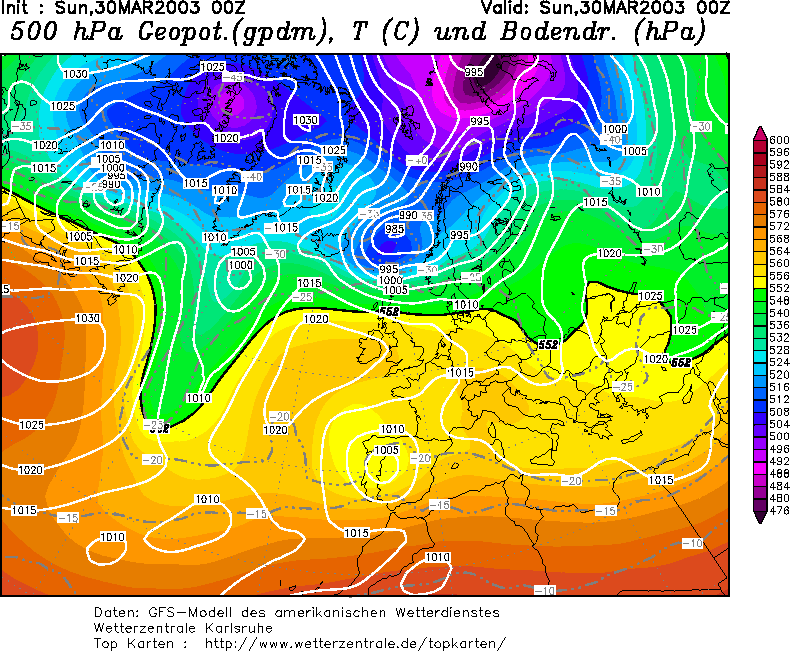|
Size: 1538
Comment:
|
Size: 3618
Comment:
|
| Deletions are marked like this. | Additions are marked like this. |
| Line 1: | Line 1: |
| == Daten == |
|
| Line 9: | Line 11: |
| == Skript == |
|
| Line 10: | Line 14: |
| #!/bin/tcsh |
|
| Line 18: | Line 24: |
| #Bild imshow(Temp[0,0:90,130:180],vmin=170,vmax=300) colorbar() |
|
| Line 22: | Line 25: |
| #Basemap m = Basemap(projection='ortho',lon_0=0.0,lat_0=75.0,resolution='l') m.bluemarble() |
#Drucklevel Lv=[1000.0,925.0,850.0,700.0,600.0,500.0,400.0,300.0,250.0,200.0,150.0,100.0, 70.0, 50.0,30.0, 20.0, 15.0, 10.0, 7.0,5.0, 3.0,2.0,1.5,1.0] |
| Line 26: | Line 29: |
| #PLOTBEFEHL FEHLT NOCH - Drucklevels auslesen}}} | # Fehlende Profile finden - Wert 1 testnan=Temp[0,:,:] testnan=testnan<0 # Temperaturprofile figure(1) subplot(1,2,1) plot(Temp[:,16,165],Lv) ylim((1000.0,1.0)) title('over ice, lat=-15,lon=74') show() subplot(1,2,2) plot(Temp[:,16,192],Lv) ylim((1000.0,1.0)) title('over open water, lat=12,lon=74') show() savefig('Soundings.png',dpi=75) # Kartendarstellung der vorhandenen Profile figure(2) m = Basemap(width=2400000,height=1600000,projection='stere',lat_ts=77.0,lon_0=15.0,lat_0=77.0,resolution='l') m.drawcoastlines() for i in range(0,30): for j in range(160,200): if testnan[i,j]==0: x,y=m(j-180.,90.-i) m.plot(x,y,'r.') x,y=m(-3.,77.) m.plot(x,y,'b.') x,y=m(10.,77.) m.plot(x,y,'b.') title('grid points with profiles(red), spectrum (blue)') show() savefig('Map.png',dpi=75) }}} |
| Line 30: | Line 71: |
| ||Index of T||TempPresLvls|| || Levels || in mb of T Levels|| |
||Index of T||TempPresLvls|| || Levels || in mb of T Levels || |
| Line 33: | Line 74: |
| || 2 || 925.0|| | || 2 || 925.0|| |
| Line 56: | Line 97: |
== Notizen == * Drucklevels - (./) * Karte mit vorhandenen Profilen - (./) gibt es bei Wolken nie Daten? - was ist mit Temperature_D? * Daten zum testen: [[http://rapidfire.sci.gsfc.nasa.gov/subsets/?subset=AERONET_Hornsund.2009073.terra.250m | 14.03.09]] [[http://rapidfire.sci.gsfc.nasa.gov/subsets/?subset=AERONET_Hornsund.2009077.terra.250m | 18.03.09]] [[http://rapidfire.sci.gsfc.nasa.gov/subsets/?subset=AERONET_Hornsund.2009089.terra.250m | 30.03.09]] [[http://rapidfire.sci.gsfc.nasa.gov/subsets/?subset=AERONET_Hornsund.2009090.terra.250m | 31.03.09]] [[http://rapidfire.sci.gsfc.nasa.gov/subsets/?subset=AERONET_Hornsund.2009091.terra.250m | 01.04.09]] * Koordinaten - von der Grenzschichtgruppe - (./) Breite 77°; Länge -3° bis 10° * Profile plotten - (./) * Grenzschichtdicke in hPa bestimmen - sind überhaupt Inversionen sichtbar? nein - Bodendruck herausfinden (./) {{attachment:Rtavn00120030330.png}} * Grenzschichtdicke in Meter umrechnen barometrische Höhenformel: {{{#!latex $\Delta z = \frac{R_L T}{g}ln\left(\frac{p}{p_s}\right)$}}} R=287,1J/kgK; Annahme: T=const.; p=Druckniveau der Wolkenobergrenze, ps=Bodendruck aus Karte (s.o.) |
Daten
Temperaturprofile: AIRS
Hilfreiche Links:
Skript
1 #!/bin/tcsh
2
3 from pyhdf import SD
4 from pylab import *
5 from mpl_toolkits.basemap import Basemap
6
7 fid=SD.SD('AIRS.2003.03.30.L3.RetStd001.v5.0.14.0.G07215021620.hdf')
8 T=fid.select('Temperature_A')
9 Temp=T.get()
10
11
12 #Drucklevel
13 Lv=[1000.0,925.0,850.0,700.0,600.0,500.0,400.0,300.0,250.0,200.0,150.0,100.0,
14 70.0, 50.0,30.0, 20.0, 15.0, 10.0, 7.0,5.0, 3.0,2.0,1.5,1.0]
15
16
17 # Fehlende Profile finden - Wert 1
18 testnan=Temp[0,:,:]
19 testnan=testnan<0
20
21 # Temperaturprofile
22 figure(1)
23 subplot(1,2,1)
24 plot(Temp[:,16,165],Lv)
25 ylim((1000.0,1.0))
26 title('over ice, lat=-15,lon=74')
27 show()
28 subplot(1,2,2)
29 plot(Temp[:,16,192],Lv)
30 ylim((1000.0,1.0))
31 title('over open water, lat=12,lon=74')
32 show()
33 savefig('Soundings.png',dpi=75)
34
35 # Kartendarstellung der vorhandenen Profile
36 figure(2)
37 m = Basemap(width=2400000,height=1600000,projection='stere',lat_ts=77.0,lon_0=15.0,lat_0=77.0,resolution='l')
38 m.drawcoastlines()
39
40 for i in range(0,30):
41 for j in range(160,200):
42 if testnan[i,j]==0:
43 x,y=m(j-180.,90.-i)
44 m.plot(x,y,'r.')
45
46 x,y=m(-3.,77.)
47 m.plot(x,y,'b.')
48 x,y=m(10.,77.)
49 m.plot(x,y,'b.')
50 title('grid points with profiles(red), spectrum (blue)')
51
52 show()
53 savefig('Map.png',dpi=75)
Drucklevel:
Index of T |
|
Levels |
in mb of T Levels |
1 |
1000.0 |
2 |
925.0 |
3 |
850.0 |
4 |
700.0 |
5 |
600.0 |
6 |
500.0 |
7 |
400.0 |
8 |
300.0 |
9 |
250.0 |
10 |
200.0 |
11 |
150.0 |
12 |
100.0 |
13 |
70.0 |
14 |
50.0 |
15 |
30.0 |
16 |
20.0 |
17 |
15.0 |
18 |
10.0 |
19 |
7.0 |
20 |
5.0 |
21 |
3.0 |
22 |
2.0 |
23 |
1.5 |
24 |
1 |
Notizen
Drucklevels -

Karte mit vorhandenen Profilen -
 gibt es bei Wolken nie Daten? - was ist mit Temperature_D?
gibt es bei Wolken nie Daten? - was ist mit Temperature_D? - Daten zum testen:
Koordinaten - von der Grenzschichtgruppe -
 Breite 77°; Länge -3° bis 10°
Breite 77°; Länge -3° bis 10° Profile plotten -

Grenzschichtdicke in hPa bestimmen - sind überhaupt Inversionen sichtbar? nein - Bodendruck herausfinden


Grenzschichtdicke in Meter umrechnen barometrische Höhenformel:
latex error! exitcode was 2 (signal 0), transscript follows:
R=287,1J/kgK; Annahme: T=const.; p=Druckniveau der Wolkenobergrenze, ps=Bodendruck aus Karte (s.o.)
